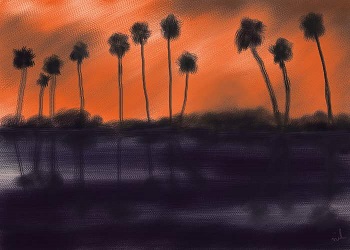(Untitled, from the sonnet cycle Bengal the Beautiful—#1)
Jibanananda Das
Translated from the Bangla by
Clinton B. Seely

Again I shall return to the Dhansiri's banks, to this Bengal,
Not as a man, perhaps, but as a shalik bird, or a white hawk.
As, perhaps, a crow of dawn in this land of autumn's new rice harvest,
I'll float upon the breast of fog one day in the shade of a jackfruit tree.
Or I'll be the pet duck of some teenaged girl — ankle bells upon her reddened feet —
I'll spend the whole day floating on duckweed-scented waters.
Once again I'll come, smitten by Bengal's rivers, fields, to this
Green and kindly land of Bengal, moistened by the waves of the Jalangi.
Perhaps you'll gaze at buzzards soaring, borne upon sunset breezes,
Perhaps you'll hear a spotted owl screeching from a shimul tree branch,
Perhaps a child is strewing puffed rice on the grass of some home's inner courtyard.
Upon the Rupsa river's murky waters a youth perhaps steers his dinghy with
Its torn white sail—reddish clouds scud by, and through the darkness, swimming
To their nest, you'll spot white herons. Amidst their crowd is where you'll find me.
রূপসী বাংলা — #১
আবার আসিব ফিরে ধানসিড়িটির তীরে—এই বাংলায়
হয়তো মানুষ নয়—হয়তো বা শঙ্খচিল শালিখের বেশে;
হয়তো ভোরের কাক হ'য়ে এই কার্তিকের নবান্নের দেশে
কুয়াশার বুকে ভেসে একদিন আসিব এ কাঁঠাল-ছায়ায়;
হয়তো বা হাঁস হবো—কিশোরীর—ঘুঙুর রহিবে লাল পায়,
সারা দিন কেটে যাবে কল্মীর গন্ধ ভরা জলে ভেসে-ভেসে;
আবার আসিব আমি বাংলার নদী মাঠ ক্ষেত ভালোবেসে
জলাঙ্গীর ঢেউয়ে ভেজা বাংলার এ সবুজ করুণ ডাঙায়;
হয়তো দেখিবে চেয়ে সুদর্শন উড়িতেছে সন্ধ্যার বাতাসে;
হয়তো শুনিবে এক লক্ষ্মীপেঁচা ডাকিতেছে শিমুলের ডালে;
হয়তো খইয়ের ধান ছড়াতেছে শিশু এক উঠানের ঘাসে;
রূপ্সার ঘোলা জলে হয়তো কিশোর এক শাদা ছেঁড়া পালে
ডিঙা বায়;—রাঙা মেঘ সাঁতরায়ে অন্ধকারে আসিতেছে নীড়ে
দেখিবে ধবল বক; আমারেই পাবে তুমি ইহাদের ভিড়ে—
Notes:
রূপসী বাংলা — #১, one of sixty-odd sonnets focusing on Bengal and composed in the early 1930s
just after Jibanananda had returned to his paternal home in Barisal (in Bangladesh)
following a very short stint of several months teaching in Delhi, the only time in his life
that he lived outside Bengal. The entire sonnet cycle was published posthumously by the
poet's brother, Asokananda Das, under the title of Bengal the Beautiful (রূপসী বাংলা).
The sonnet form per se, introduced by Michael Madhusudan Datta (1824-73) in the
1860's, continues to flourish in Bengali poetry today. Dhansiri, Jalangi, and Rupsa are
three of the many, many rivers of the riverine delta in which Barisal is located. The
shalik happens to be one of the more common birds of Bengal; the shimul is known for
its kapok-producing seed pods.
Illustrated by Nilanjana Basu. Nilanjana has been illustrating regularly for Parabaas. She is based in California.
Translation published in Parabaas: June 2015
